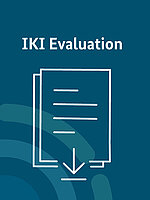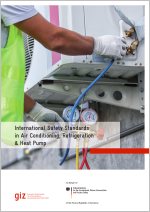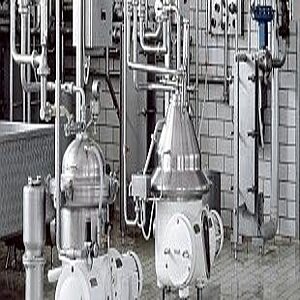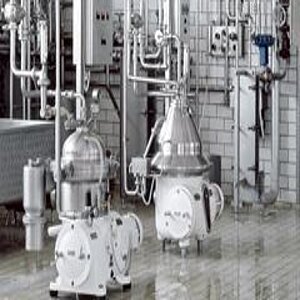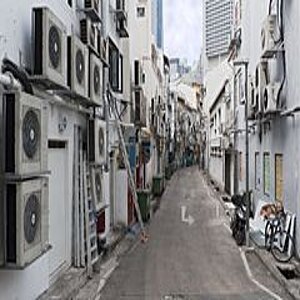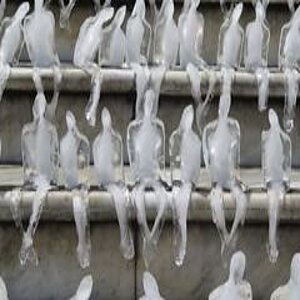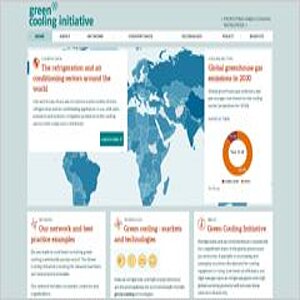Green Cooling: 20 Years and Beyond
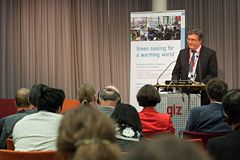
20 years of Germany's bilateral engagement in the multilateral process of the Montreal Protocol - on this occasion, the Deutsche Gesellschaft für Internationale Zusammenarbeit (GIZ), on behalf of the German Government, hosted a conference on September 28 in Eschborn. About 100 representatives from governments, industry, NGOs and implementing agencies attended this event.
In 1987, the international community adopted the Montreal Protocol to jointly end the use of ozone depleting substances (ODS) such a chlorofluorocarbons (CFC) and hydrochlorofluorocarbons (HCFC). Germany has been assisting developing countries with the conversion of their refrigeration and air conditioning (RAC) sectors to environmental friendly substitutes. The German government especially promotes technologies using so-called natural refrigerants. These are not only ozone neutral, they are also climate-friendly. On the other hand, conventional substitutes for ozone depleting substances (ODS) - the so-called hydrofluorocarbons (HFC) - are strong greenhouse gases (GHG). Furthermore, conventional technologies are often highly energy inefficient, causing high energy consumption and thereby indirect GHG emissions from fossil fuels.
The International Climate Initiative (IKI) of the Federal Environment Ministry BMUB has been supporting these efforts since 2008 with projects aiming at transforming the RAC sectors in partner countries to energy efficient, climate friendly technologies. These projects contribute to the emission reductions equivalent to about 100 million tons CO2, realized with the support of the German government.
The event on September 28 served as a platform to look back on these and other successful milestones in the history of German bilateral activities for ozone and climate protection. Dr. Christian Meineke, Head of Division IG II 1 for Fundamental aspects of chemical safety and chemicals legislation at BMUB emphasized that these German projects have been instrumental in advancing the relevant international negotiations. Moreover, the transfer of technology and knowledge to partner countries actively contributes to sustainable development and promotes the establishment of green economies, yielding long-lasting socio-economic benefits for the communities. This statement was supported by the attending officers from the National Ozone Unit (NOUs) from Brazil, China, Grenada, and Kenya. They pointed out that especially countries, where there is no manufacturing industry for RAC equipment benefit from the advisory support from Germany when choosing substitute technologies. Natural refrigerants are often still neglected because of the industry's strong influence in the process of establishing international standards. As a result, there are unjustified market barriers to technologies operating with natural refrigerants. The representatives from China, one of the largest producing countries of RAC equipment worldwide, focused on the special challenges China faces during the transformation to a climate- and ozone friendly RAC sector.
The event made clear that despite achievements such as the recovery of the ozone layer and GHG emission reductions in the past 25 years, the mission goes on. The RAC sector is rapidly growing especially in Asian emerging economies. In a Business as Usual (BAU) Scenario, RAC emissions could contribute as much as about 13 percent to the global GHG emissions by 2030. However, there is no global obligation yet to reduce the use of these strong greenhouse gases. A joint commitment to phase out HFC should be taken up as a central concern in the upcoming UN Climate Change Conference in December 2015 in Paris.
The link has been copied to the clipboard
Contact
IKI Office
Zukunft – Umwelt – Gesellschaft (ZUG) gGmbH
Stresemannstraße 69-71
10963 Berlin
Related Videos
Related Publications
-
 05/ 2022 | IKI Evaluation
05/ 2022 | IKI EvaluationGreen Cooling Initiative
German with executive summary in English (PDF, 1 MB)




